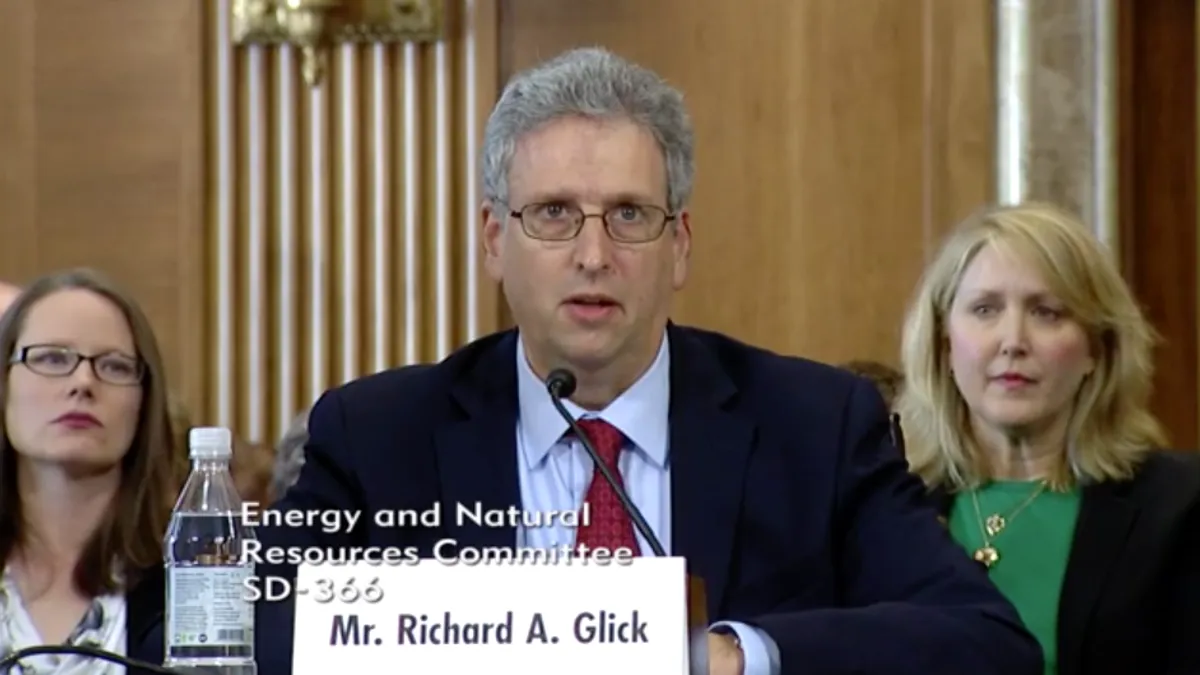Dive Brief:
- Commissioner Richard Glick was named chair of the Federal Energy Regulatory Commission by President Joe Biden Thursday morning.
- Glick was considered a front runner for the chairmanship as the longest serving Democrat on the commission. He will succeed Chairman James Danly, and the commission is expected to retain its Republican majority until Commissioner Neil Chatterjee's term is up June 30.
- Glick has said publicly that on the electric side he would prioritize transmission reform, reassessing capacity markets, and continuing efforts to lower barriers to clean energy resources in regulated markets. On gas, he believes the commission should rethink how it assesses greenhouse gas emissions and more seriously review environmental justice impacts when approving gas infrastructure.
Dive Insight:
Glick opposed many of the actions FERC took under Chairmen Chatterjee and Danly, and his long list of dissents and public comments foreshadow a commission more bullish on its role in the power sector's energy transition.
"I'm honored President Joe Biden has selected me to be [FERC] Chairman," Glick said in a tweet. "This is an important moment to make significant progress on the transition to a clean energy future. I look forward to working with my colleagues to tackle the many challenges ahead!"
Though Glick will still be running a majority Republican commission, he and Chatterjee have begun to find common ground on some issues in recent months, and many power sector observers think transmission reform will be one critical area Glick may tackle relatively early.
Many would also like to see a new FERC find ways to reverse or otherwise weaken the commission's controversial minimum offer price rule expansion (MOPR) in the PJM Interconnection — a rule that effectively raises the price for all state subsidized resources bidding into the region's capacity market. Glick has called that move a violation of states' rights, and many states have been vocally critical of the impact that rule could have on their clean energy programs.
On that issue, Glick may also have bipartisan support. Though Chatterjee stands by what he sees as "potential market distorting effects of state policies that favor certain resources," newly-minted Commissioners Allison Clements and Mark Christie have both indicated they think FERC should be more considerate of individual state approaches. Clements this week called out the MOPR order specifically in a dissenting comment approving part of PJM's compliance filing.
"While I did not participate in the previous orders, I strongly disagree with the imposition of a strict minimum offer price rule in this proceeding," she wrote. "I believe the Commission must look forward, past the false dichotomy presented in this proceeding that implies that we must choose to either 'protect' the markets within the Commission’s jurisdiction or to accommodate state public policy goals."
Glick also may have more bipartisan support on considering greenhouse gas emissions and environmental justice more thoroughly when approving certificates for liquified natural gas terminals and pipelines. Clements indicated in December she believed the "grave threat" of climate change should play a role in how FERC considers its legal obligations and this week commended Glick and his staff for continuing to raise the issue. Chatterjee also indicated on Tuesday that he would be willing to find common ground on that issue.
"I'm eagerly anticipating the chance to work with my colleagues to forge compromises on issues like how the commission handles greenhouse gases when it evaluates certificates," he said. "I'm confident we'll be able to craft a path forward."















